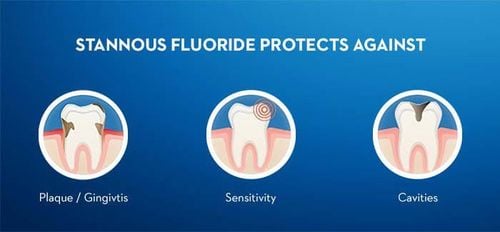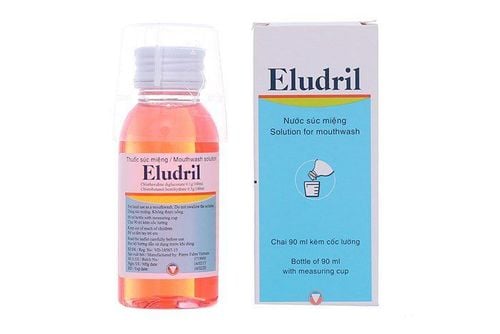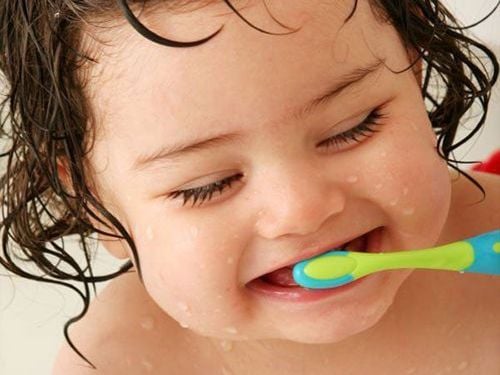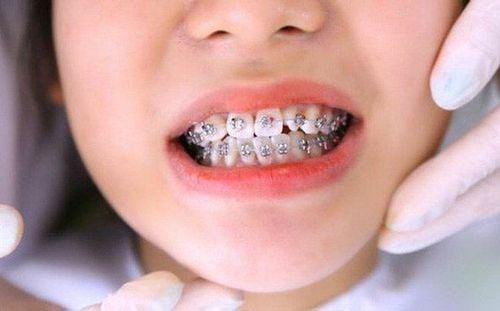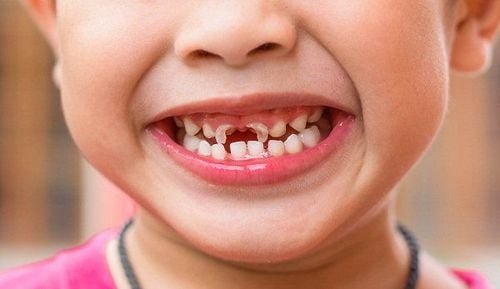This is an automatically translated article.
The article was professionally consulted by Specialist Doctor II Le Thanh Cam - Department of Pediatrics - Neonatology - Vinmec Danang International General Hospital. Uncle has 15 years of experience in diagnosis & treatment of pediatric diseases; She used to work at the Pediatric Department - Da Nang Hospital and Da Nang Center for Obstetrics and Gynecology. Her strength is diagnosis and treatment of pediatric diseases; resuscitation, pediatric emergency.
Usually the first baby tooth comes in when a child is 6 months old, and most children have all 20 baby teeth (10 upper and 10 lower) by the time they are 3 years old. Then the baby teeth gradually fall out and will be replaced by the corresponding permanent teeth. This is the period when parents need to closely monitor their child's oral development.
1. What is the age of baby teeth eruption?
Baby teeth play an important role in chewing, speaking, facial aesthetics and making room for permanent teeth to grow in later. The permanent teeth grow in and develop underneath the baby teeth. If a baby tooth is decayed, it can also damage the permanent teeth underneath. Therefore, it is necessary to promptly treat the caries of baby teeth.
On average, the baby's milk teeth eruption age is as follows:
From 6 to 7 months old: 4 lower incisors grow; From 8 to 9 months old: Grow 4 upper front teeth. By the time a child is 3-4 years old, most will have 20 baby teeth. Most children begin to have loose baby teeth at the age of 5-6 years, there are also some children with loose baby teeth starting at an earlier age at 4 years old or later at 7-8 years old. However, if your child has baby teeth that are loose and fall out too soon, they should see a dentist.
If your baby is 10 months old and hasn't had any baby teeth yet, it's late, you need to take your baby to a hospital with a specialist in Pediatric Odonto-Stomatology for advice.
Baby teeth are usually replaced by permanent teeth in the order that which comes first is replaced first.
Trắc nghiệm: Sự phát triển tinh thần, vận động của bé thế nào là đúng chuẩn?
Khi nào bé biết nói, biết hóng chuyện hay biết cầm cốc là "đúng chuẩn"? Điểm xem bạn biết được bao nhiêu mốc phát triển tinh thần, vận động "đúng chuẩn" của bé nhé!The following content is prepared under supervision of Thạc sĩ, Bác sĩ y khoa, Ma Văn Thấm , Nhi , Phòng khám Đa khoa Quốc tế Vinmec Dương Đông(Phú Quốc)
2. Age of permanent teeth eruption and age of tooth replacement in children
Usually, the permanent teeth will erupt right where the baby teeth have just fallen out. Due to the pressure of the permanent teeth below, the roots of the baby teeth will gradually dissolve, loosen and fall away, making room for the permanent teeth. The age of permanent teething of children is usually:From 6 to 8 years old: 4 lower front teeth erupt; From 7 to 9 years old: Grow 4 upper front teeth.
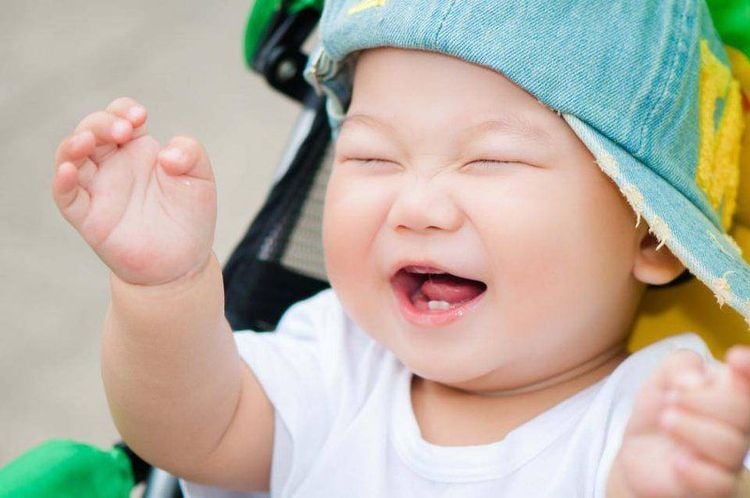
A child's teeth are considered to have normal development when the order of the permanent teeth that will erupt is similar to the baby teeth, that is, the baby teeth that come in first will fall out first.
However, the order of tooth replacement of the upper jaw will be slightly different from that of the lower jaw. If the order of prevalence for the upper jaw is: middle incisor - lateral incisor - premolar - canine and molars, then for the lower jaw it would be: central incisor - lateral incisor - canine - tooth premolars and finally the molars.
The age of tooth replacement in children takes place short or long depending on many factors:
Characteristics of each type of tooth and the position of the teeth: For single-rooted teeth, the tooth replacement time will only take place in a few weeks but for multi-rooted teeth like molars, it requires a longer time, maybe 1-2 months. Teeth that are grown in comfortable conditions will have a shorter tooth replacement time than teeth that are stuck in the gap or pinched by other teeth; Children's habits: Some children's bad habits also contribute to the time it takes to change teeth. When the baby teeth fall out, the child will find his mouth has an empty space and often put his hand in his mouth or use his tongue to act on it. This can cause inflammation, so parents need to regularly remind their children to give up these bad habits. If a child is 10 years old and has not yet erupted enough permanent incisors, they will have delayed eruption. Parents should send their baby to a specialist in Odonto-Stomatology, take a dental film to examine the condition of the tooth germ in the jawbone.
3. When to take your child to the dentist?
In the process of replacing teeth in children, parents are not allowed to arbitrarily extract children's teeth at home or with floss. This is very easy to cause bleeding gums after extraction and create an open wound in the gums.
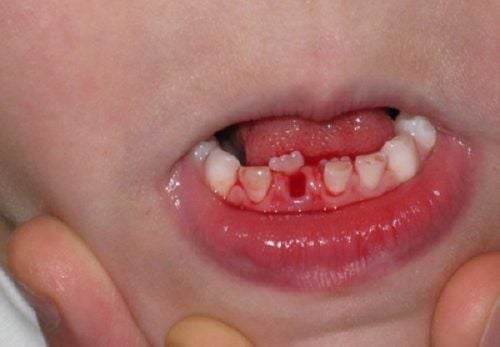
Besides, putting your hands in your mouth will create an opportunity for bacteria to enter the wound and can lead to infection. Therefore, parents should take the child to the dentist so that the doctor can choose to extract or continue to wait for the tooth to fall out.
In some special cases, such as baby teeth do not fall out by themselves, but replacement permanent teeth have come in, the dentist will actively extract baby teeth so that the permanent teeth can grow into the correct position.
In case the permanent tooth is missing space to grow, leading to misalignment, dentists will appoint early extraction or grind down the edge of the adjacent baby tooth so that the permanent tooth grows in the correct position.
4. How to take care of a child's teeth?
Because teeth have a very important role, parents need to take care of and protect their children's teeth, preferably with preventive measures such as:
Children under 3 years old should only use a toothbrush for children. children with clean water without using toothpaste because children easily swallow toothpaste that causes fluorosis, staining tooth enamel; Children from 3 years of age and older can practice brushing their own teeth with a toothpaste specifically designed for children with a very small amount of cream to avoid swallowing the cream; Teach older children how to properly brush their teeth: Brush teeth regularly with fluoride-containing toothpaste; should brush teeth after each meal or at least twice daily; should brush teeth vertically from top to bottom and vice versa; Children should be taken to the dentist every 6 months for regular check-ups and early treatment of tooth decay, dental diseases as well as dental hygiene (to remove tartar); Always keep a close eye on the process of tooth replacement in children and avoid giving them gum, limit sweet foods, hard foods that are difficult to chew because they easily lead to tooth decay; The teeth that come out cause the child to feel pain, so parents should give the child soft foods such as porridge, soup or fruit juice; During this period, some children maintain bad habits such as sucking their fingers, pushing their teeth with their tongues, grinding their teeth, breathing through their mouths, leaning on their chin... These habits will lead to protruding teeth and teething. misaligned, crowded or too spaced teeth, or the upper teeth do not match with the lower teeth, so children should be advised not to do these actions. The period of baby teeth eruption and tooth replacement in children is a period when parents need to pay close attention to dental care for children, because it can affect the quality of permanent teeth later when the baby is an adult.
In addition, parents should also apply some methods of changing habits and improving nutrition to support the child's teeth to develop better.
Besides, parents also need to supplement their children with essential micro-minerals such as zinc, lysine, chromium, selenium, vitamin B1, ... to fully meet the nutritional needs of children. The addition of these essential vitamins also supports digestion, enhances nutrient absorption, improves anorexia, and helps children eat well. Parents can simultaneously apply dietary supplements and functional foods derived from nature for easy absorption. The most important thing is that improving your baby's symptoms often takes a long time. The combination of many types of functional foods at the same time or continuously changing many types in a short time can cause the baby's digestive system not to adapt and completely not good. Therefore, parents must be really patient with their children and regularly visit the website vimec.com to update useful baby care information.






